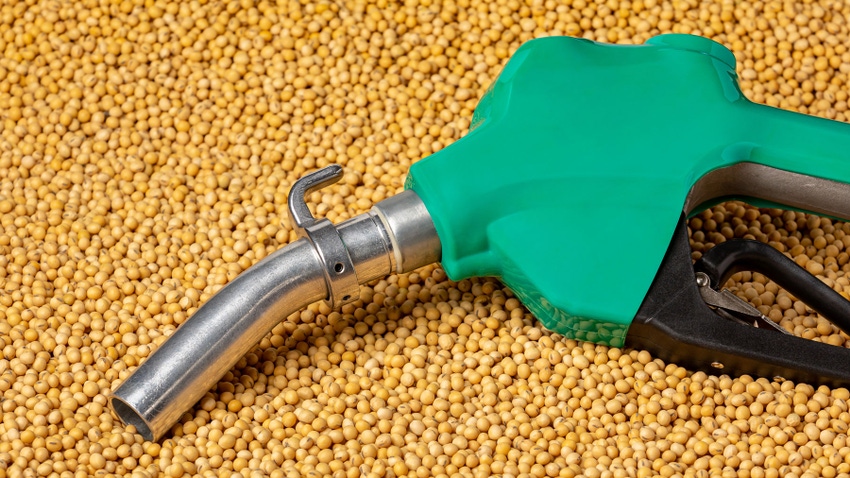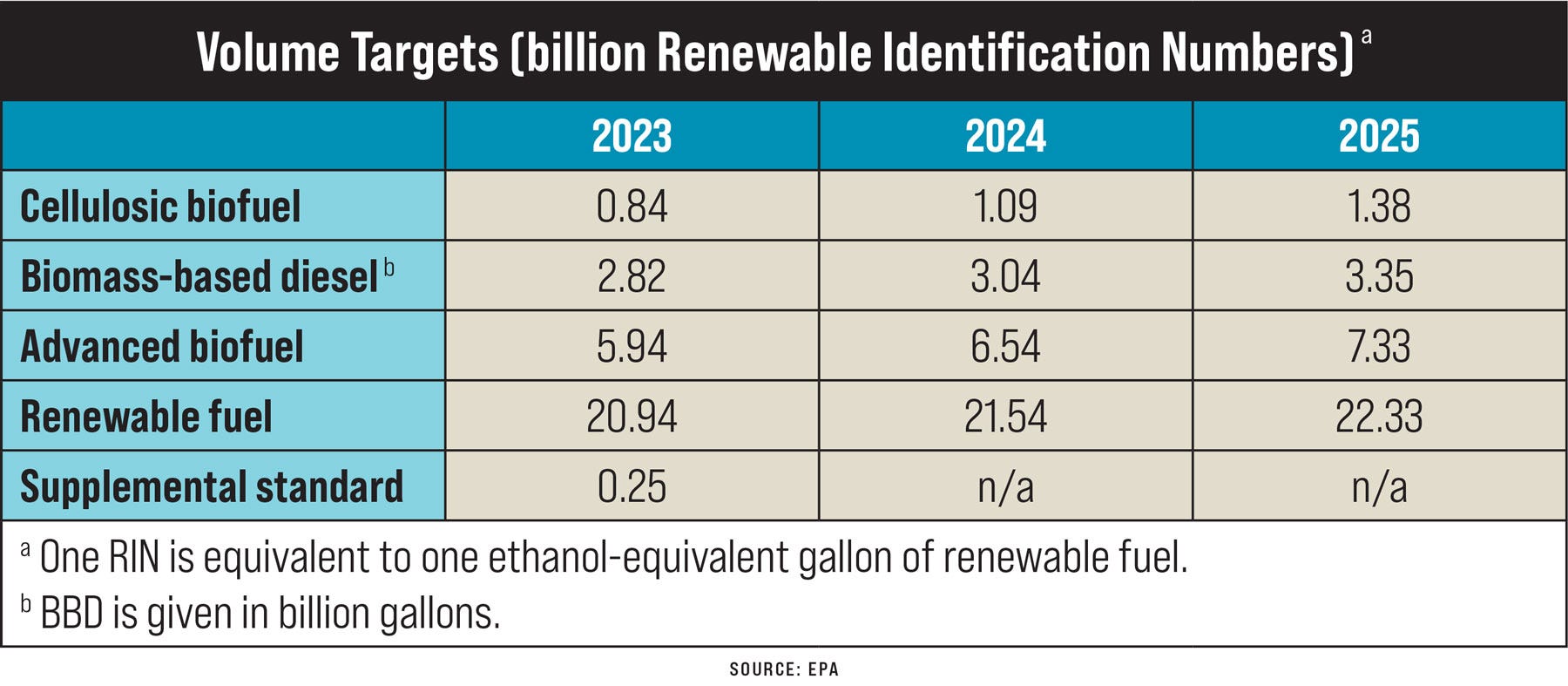June 30, 2023

Dismay and disappointment are felt by biofuel producers in response to the Environmental Protection Agency’s recent setting of what are seen as extremely underwhelming Renewable Fuel Standard volumes for 2023, 2024 and 2025.
In a press release issued by the Minnesota Soybean Growers Association, the MSGA and the Minnesota Biodiesel Council (MBC) say the biomass-based diesel and advanced biofuel volumes are set at roughly one-third what industry advocates recommended to the agency.
“We’re very disappointed. The EPA just doesn’t seem to prioritize renewable fuels and recognize the many ways in which biodiesel improves our environment and economy,” says MSGA President Bob Worth, who farms near Lake Benton, Minn. “Even when we prove time and time again that this is a good product that does what it’s supposed to, they just have their mind set in one direction.”
The rule does not accurately reflect the growth expected in the industry and falls far below the industry’s current production. The 2023 finalized rule made zero increases to the 2023 volumes compared to the draft rule. For 2024 and 2025, EPA made modest increases compared to the draft rule.
The Minnesota Corn Growers Association is also disappointed that the finalized plan cuts conventional biofuel blending requirements, from its original proposal, by 250 million gallons annually in 2024 and 2025.
“Ethanol is a cleaner-burning, lower-cost biofuel that benefits drivers, farmers and ultimately, all U.S. residents,” says MCGA President Richard Syverson in an MCGA press release. “We urge the EPA and lawmakers to advance policies that increase access to biofuels and will continue advocating for increased access to blends like E15 and E85.”

Little consolation
While MCGA is disappointed about the cut in conventional biofuel requirements, the organization is pleased that the EPA did not adopt a proposal to allow electric vehicle manufacturers to generate credits for estimated use of electricity generated from renewable biomass and biogas.
“EPA is undercutting the certainty that our industry hoped for from a three-year RFS rule,” says Kurt Kovarik, vice president of federal affairs with Clean Fuels Alliance America. “U.S. clean fuel producers, oilseed processors, fuel distributors and marketers have all made significant investments to grow the industry rapidly over the next several years. The industry responded to signals from the [Joe] Biden administration and Congress aiming to rapidly decarbonize U.S. fuel markets — particularly aviation, marine and heavy-duty transport — and make clean fuels available to more consumers. The volumes EPA finalized today are not high enough to support those goals.”
The total volumes for 2025 represent just over 20% growth over the 2022 biomass-based diesel Renewable Volume Obligations previously set by the EPA. However, these totals match current production levels and do not actually account for industry growth. The Energy Information Administration predicts an increase in BBD production of over 800 million gallons in 2023 alone. The final rule offers RFS volume increases of just 590 million gallons over the course of three years.
“This announcement is a letdown for soy growers. It threatens the success of the biomass-based diesel industry by significantly dialing back annual increases in volume obligations and failing to account for the progress being made in biofuels investment and growth,” says Daryl Cates, American Soybean Association president. “Farmers and biomass-based diesel producers face real, concerning consequences from low RFS volumes that do not reflect current production and demand, and we’re disappointed in this lack of support for the industry.”
ASA has called on the EPA and the Biden administration to raise volumes to a level that will continue to support growth of the biofuels industry.
Vital market
Biomass-based diesel is a vital domestic market for soybean farmers. The RFS has reduced U.S. dependence on foreign oil and added value by increasing demand for soybeans and corn. Billions of dollars are being invested in biodiesel, renewable diesel, soybean crushing plants and other infrastructure to be able to produce more BBD.
Aside from its economic benefits — including biodiesel adding more than $1 to every bushel of soybeans — the biodiesel industry and RFS help protect the environment. Studies show that biodiesel reduces greenhouse gas emissions by more than 50% and displaces roughly 130 million gallons of petroleum diesel in Minnesota each year. Using a B20 blend in the summer and a B5 blend in the winter equates to removing the emissions from nearly a quarter-million vehicles from state roads every year.
“While we’re underwhelmed by today’s announcement from the EPA, we do appreciate the support of Minnesota’s congressional leaders in Washington, D.C., and hope they continue to urge their colleagues and the administration to support biodiesel,” says Mike Youngerberg, MBC executive director.
The expanded crush capacity companies have announced the next three years would increase soybean oil supplies by about 5.5 billion pounds. This translates into about 700 million gallons of renewable diesel, far above the EPA’s three-year RVO growth of only about 590 million gallons. Adding growth from other feedstocks to the announced crush expansion creates a feedstock-abundant situation.
“EPA’s final rule undercuts these investments, and the market may not be able to absorb the expected future production,” Cates says. “It’s also a huge, missed opportunity for a low-carbon fuel to reduce greenhouse gas emissions and scale back the country’s reliance on imported oil.”
Soy farmers were encouraged by the EPA’s 2022 volume target — which included the highest-ever number for total renewable fuels and specifically for biomass-based diesel since the renewable fuel standard was created — and were hopeful the EPA would continue its support of the RFS. However, EPA’s final rule will limit growth in soy-based biofuels over the next three years and leaves Minnesota farmers and biofuels industry partners reeling.
Allen Schaeffer, Diesel Technology Forum executive director, also issued a statement saying that “biodiesel and renewable diesel fuel deliver significant carbon reductions in every application right now. These fuels can be used in any new or existing diesel engine. They’re endorsed by engine and equipment makers. Trucking fleets, farmers, contractors and others use these fuels as an affordable way to help reduce greenhouse gas and other emissions by up to 80%. That’s immediately and without investments in new infrastructure, vehicles or equipment.”
The EPA’s small nudge in biofuel volumes at this time of otherwise progressive climate policies is as confusing as it is inconsistent, Schaeffer says. “The agency states that ‘Low-carbon fuels are an important part of reducing greenhouse gas emissions in the transportation sector, and the RFS program is a key federal policy that supports the development, production, and use of low-carbon, domestically produced renewable fuels (see EPA’s pre-publication Final Rule).
“Yet rather than issuing a robust and growth-oriented future volume set rule that expands the use of renewable diesel and biodiesel fuels to drive faster and deeper reductions in greenhouse gas emissions, the EPA touts it primarily as an energy security strategy to reduce 140,000 barrels of foreign oil imports,” Schaeffer concludes.
“We know that biodiesel is good for our environment, good for the economy and good for farmers,” Worth says. “We’ve proven this over the past 20 years.”
Minnesota Soybean Growers Association, Diesel Technology Forum and Minnesota Corn Growers Association contributed to this article.
You May Also Like




